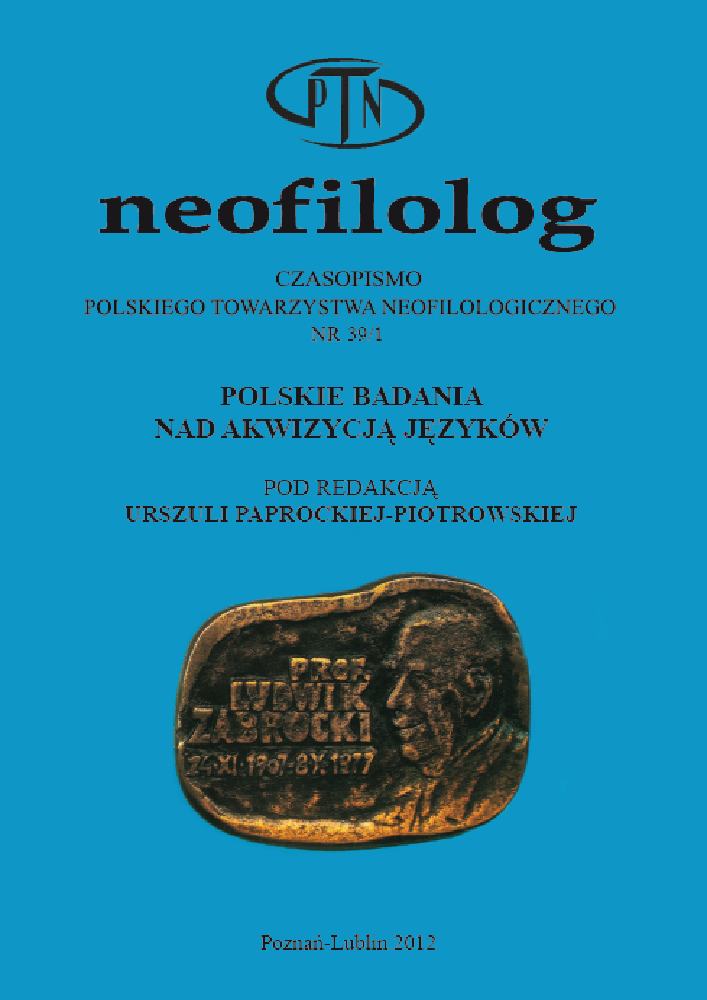Résumé
The article discusses the issue of collaborative writing during classes of academic writing for advanced students of English as a foreign language. It describes a research project in which the influence of collaborative planning on the quality of written discourse was analysed. The research found that essays based on the plan constructed by students in pairs were better in terms of organisation, linguistic variety, content and accuracy than essays written by these participants individually. Moreover, the questionnaires written by the participants revealed their positive attitude to collaborative essay planning.
Références
Cheng, Y.-S. 2004. „A measure of second language writing anxiety: Scale development and Comprehensible Input”. Applied Linguistics 4: 126-141.
Dobao, A.F. 2012 „Collaborative writing tasks in the L2 classroom: Comparing group, pair, and individual work”. Journal of Second Language Writing 21(1): 40-58.
Kim, Y. 2008. „The contribution of collaborative and individual tasks to the acquisition of L2 vocabulary”. The Modern Language Journal 92: 114-130.
Kintsch, W., van Dijk, T. A. 1978. „Toward a model of text comprehension and production”. Psychological Review 85/5: 363-394.
Kuiken, F., Vedder, I. 2002a. „The effect of interaction in acquiring the grammar of a second language”. International Journal of Educational Research 37: 343-358.
Kuiken, F., Vedder, I. 2002b. „Collaborative writing in L2: The effect of group interaction on text quality” (w) New directions for research in L2 writing (red. G. Rijlaarsdam, Ransdell, S. i M. Barbier). Dordrecht: Kluwer Academic Publishers: 168-187.
Long, M. 1983: „Native Speaker/Non-native Speaker Conversation and the Negotiation of preliminary validation”. Journal of Second Language Writing 13: 313-335.
Shehadeh, A. 2011. „Effects and student perceptions of collaborative writing in L2”. Journal of Second Language Writing 20(4): 286-305.
Storch, N. 2005. „Collaborative writing: Product, process and students’ reflections”. Journal of Second Language Writing 14(3): 153-173.
Storch, N., Wigglesworth, G. 2007. „Writing tasks: Comparing individual and collaborative writing” (w) Investigating tasks in formal language learning (red. M.P. Garcia Mayo). London: Multilingual Matters: 157-177.
Storch, N., Wigglesworth, G. 2010. „Learners’ processing, uptake, and retention of corrective feedback on writing”. Studies in Second Language Acquisition 32: 303-334.
Swain, M. (1999). „Integrating language and content teaching through collaborative tasks” (w) Language teaching: New insights for the language teacher (red. W.A. Renandya i C.S. Ward). Singapore: Regional Language Centre: 125-147.
Swain, M. 2006. „Languaging, agency and collaboration in advanced language proficiency” (w) Advanced language learning: The contribution of Halliday and Vygotsky (red. H. Byrnes). London: Continuum: 95-108.
Vygotsky, L.S. 1978. Mind in society. The development of higher psychological processes.
Cambridge, Mass: Harvard University Press.
Licence
© Małgorzata Marzec-Stawiarska 2012

Ce travail est disponible sous licence Creative Commons Attribution - Pas de Modification 4.0 International.
Auteurs :
Les auteurs de textes acceptés pour publication dans la revue Neofilolog sont tenus de remplir, signer et renvoyer à l'adresse de la rédaction, un accord sur l'octroi d'une licence gratuite pour les œuvres, avec obligation d'accorder une sous-licence CC.
En vertu de cet accord, les auteurs des textes publiés dans la revue Neofilolog accordent à l'Université Adam Mickiewicz de Poznań une licence non exclusive et gratuite et permettent l'utilisation de la sous-licence Creative Commons Attribution-NoDerivatives 4.0 International (CC BY-ND 4.0).
Les auteurs se réservent le droit de disposer librement de l'œuvre.
Utilisateurs :
Les utilisateurs d'Internet intéressés ont le droit d'utiliser les œuvres publiées à partir de l'année 2017 sous réserve des conditions suivantes :
- reconnaissance de la qualité d'auteur - l'obligation de fournir des informations sur la qualité d'auteur, le titre, la source (liens vers l'œuvre originale, DOI) et la licence, ainsi que l'œuvre distribuée ;
- sans créer d'œuvres dérivées - l'œuvre doit être conservée dans sa forme originale, p. ex. les traductions ou les interprétations ne peuvent être distribuées sans le consentement de l'auteur.
Tous les textes publiés sont soumis au droit d'auteur.
Autres :
L'Université Adam Mickiewicz de Poznań se réserve le droit à la revue dans son ensemble (mise en page, forme graphique, titre, conception de la couverture, logo, etc.).
.
